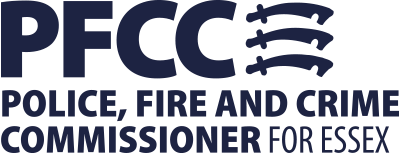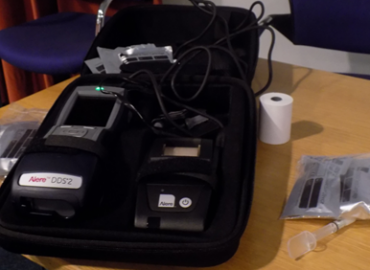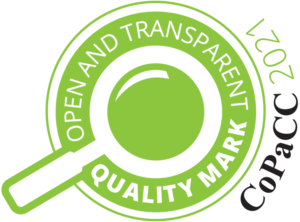Tackling the consequences of Class A drug abuse
An innovative programme of Drug Testing on Arrest has now been extended to every police custody suite in Essex thanks to close partnership working between Essex Police, local authorities, specialist drug treatment programmes, the courts, the Integrated Offender Management System, the Crown Prosecution Service and the Police and Crime Commissioner for Essex.
The programme aims to increase the number of people seeking treatment for Class A drug misuse and thereby reduce their re-offending, leading to fewer victims of crime.
In 2013, a pilot programme was conducted in police custody in Chelmsford to test arrested suspects for the use of Class A drugs. A positive test for a banned substance triggered early intervention with drug users to address their use of illegal substances and any links to criminal behaviour. During the Chelmsford pilot, 600 people were tested following arrest, of whom 25 per cent were found to be positive for Class A drug use. Around 65 per cent of those who tested positive agreed to enter a treatment programme.
The Chelmsford pilot project was funded with £16,000 from the PCC for Essex, and money from Essex County Council Public Health, the Essex Drug and Alcohol Action Team and Safer Essex, and led to a successful bid for central government funding to expand the programme.
In the summer of 2014, Essex Police was awarded £718,000 by the Home Office to enable this roll out, supported by funding from Essex County Council (£322,000), Thurrock Council (£80,000), Southend-on-Sea Borough Council (£100,000) and the Office of the Police and Crime Commissioner for Essex (£372,000). The total funding available amounts to around £1.3million each year for a two year period.
Figures for the single month of April 2015 show that 270 drug tests after arrest were conducted in Essex Police custody suites. 117 (43 per cent) of the people tested were positive for opiates and /or crack cocaine. Of these, 78 people (67 per cent) had been arrested on suspicion of shoplifting.
Stephen Kavanagh, Chief Constable of Essex Police, said:
“Many drug users commit crime to feed their addiction, so fewer drug users means fewer criminals and crucially fewer victims. Doing things the way they’ve always been done won’t break the cycle. This vital funding brings police and specialist drugs workers together to turn lives around, get the right treatment in place and keep our communities from the harm that crime causes.”
Nick Alston, Police & Crime Commissioner for Essex, said: “The Drug Testing on Arrest programme is based on research about criminal offending profiles. The evidence shows that successful treatment for drug misuse has the potential to reduce re-offending and keep our communities safer. I’m delighted that Home Office Police Innovation funding of £718,000 and contributions from Essex County Council, Southend and Thurrock councils and other partners including my Office, has enabled this programme to be expanded across our county. It’s also important the programme will be subject to a major academic evaluation by the University of Essex School of Health and Human Sciences, ensuring that its effectiveness is subjected to a full analysis.”
Essex County Councillor Anne Brown, cabinet member with responsibility for Public Health, said: “I am delighted that Essex County Council is supporting our partners at Essex Police in rolling out this important initiative across the county. Drug misuse has a significant impact on individuals, families, friends and local communities. At ECC we are proud to provide innovative and high quality treatment and support services for people affected by drug and alcohol misuse.”
Glyn Halksworth, Strategy Manager for the Southend-on-Sea Borough Council Drug and Alcohol Commissioning Team, said: “Early intervention and an innovative approach like this can have a real big impact on supporting those affected by drugs and alcohol. We are delighted to be supporting this important scheme that will make a real difference in Southend-on-Sea and throughout the entire county, helping to reduce re-offending and save money from the public purse.”
As part of the national Drug Interventions Programme, people arrested by police for specific Trigger Offences can be drug tested, within a legal framework. This programme of drug testing is called Drug Testing on Arrest. The so called “Trigger Offences” are those crimes (mainly acquisitive crimes such as theft, burglary, vehicle crime and robbery) which are most strongly linked with drugs misuse. The idea behind the initiative is to divert people into drug treatment so that they can address their addictions and move away from criminal behaviour.
Details of the legal framework for Drug Testing on Arrest and a list of the Trigger Offences can be seen here.
The costs and the harm to victims caused by individuals seeking to fund a Class A drug addiction is considerable. According to National Treatment Agency research, a heroin or crack cocaine user costs society an average of £26,074 per year. Home Office research has found that the overall volume of offending of over 7,700 individuals nationally was 26% lower following identification through a positive drug test in police custody. Around half of the individuals who tested positive for Class A drug use showed a significant decline in offending of almost 80% in the following six months. All this research supports the view that securing treatment at the earliest opportunity reduces offending significantly.










